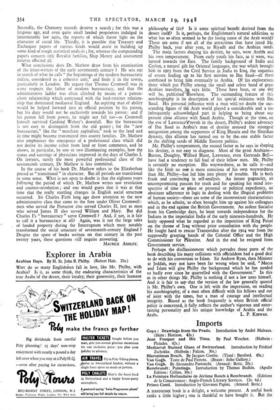Explorer in Arabia
Arabian Days. By H. St. John B. Philby. (Robert Hale. 21s.)
WHY do so many EnglishMen fall in love, like Mr. Philby, with Arabia? Is it, as some think, the endearing characteristics of the true Arabs of the desert, their loyalty; their generosity, their humane
philosophy of life? Is it some spiritual benefit derived from the desert itself? Is it, perhaps, the Englishman's natural addiction to what has so often seemed to be the losing cause of the Arab world? These are some if not all of the attractions that have lured Mr. Philby back, year after year, to Riyadh and the Arabian sands.
The main factors shaping his destiny, he says, were Arabia and his own temperament. From early youth his face, as it were, was turned towards the East. The family background of India and Ceylon, a natural gift for Oriental languages, the war which brought him in 1915 from the Civil Service in India to Iraq, the sequence of events leading up to his first mission to Ibn Saud—all these combined to bring him eventually to Arabia. Of his explorations there which put Pliny among the small and select band of great
Arabian travellers, says little. These have been, or one day will be, publishe:rEsewhere. The outstanding feature of this autobiography is its description of his special relations with Ibn Saud. His personal influence with a man with-mat doubt the out- standing figure of the Arab world played a considerable and a too infrequently acknowledged part in helping to bring about our present close alliance with Saudi Arabia. Though at the time, on the eve of Lawrencelerevolt in the desert, Philby's ardent advocacy of Ibn Saud as Arabia's man of destiny aroused the strongest antagonism among the supporters of King Husain and the Sherifian dynasty, this alliance has turned out to be the. one stable factor in the shifting sands-of Middle Eastern politics. Mr. Philby's temperament, the second factor as he says in shaping his destiny, is not easy to diagnose. Most of the great Arabians— Burton, Doughty, Wilfred Blunt, Lawrence, even Gertrude Bell— have had a tendency to fall foul of their fellow men. Mr. Philby is certainly no exception. His waywardness, as he calls it—and like the Irish no one is more conscious of his own waywardness than Mr. Philby—has led him into plenty of trouble. He is both frank and convincing in self-analysis. An innate pugnacity, an uncompromising passion for truth and for speaking his mind irre- spective of time or (place or personal or political expediency, an obstinate adherence to logic in dealing with the illogical problems of human society—these are some of the inconvenient characteristics which, as he admits, so often brought him up against his colleagues and in the end against the British Government. An ardent Socialist from his Cambridge days, he leant towards independence for the Indians in the imperialist India of the early nineteen-hundreds. He hotly opposed what he regarded as the imposition of King Feisal on the throne of Iraq without prior consultation with the people. He fought hard to rescue Transjordan after the 1914 war from the supposedly grasping- hands of the Colonial Office and the High Commissioner for Palestine. And in the end he resigned from Government service.
Perhaps the disillusionment which pervades those parts of the book describing his many collisions with officialdom had a good deal to do with his conversion to Islam. Sir Andrew Ryan, then Minister at Jeddah, may not have been far wrong when he said, " Mecca and Islam will give Philby the background which he has needed so badly ever since he quarrelled with the Government." In this as in other things Mr. Philby is nothing if not a law unto himself. And it is fair to say= that the version of the law generally quoted is Mr. Philby's own. One is left with the impression, on reading his autobiography, of a man often difficult with his fellows and out of joint with the times, but a man of courage and intellectual integrity. Biased as the book frequently is when British official policy is concerned, it fully reflects the author's vigorous and enter- taining personality and his unique knowledge of Arabia and the






























 Previous page
Previous page